Are you wondering which is better between WordPress vs Joomla? Wonder no more, because we shall answer that question for you.
WordPress and Joomla are two of the most popular Content Management Systems (CMSs) in the World. A Content Management System helps you to write, manage, and publish your digital content without getting your hands dirty with tons of code.
Despite being in the same field and seemingly identical approach to things, Joomla and WordPress are worlds apart in some topics. Join us in this wordy adventure of discovering the differences, pros, and cons of WordPress vs Joomla.
1. WordPress vs Joomla: Overview
Before we actually get to the major clash, let’s first introduce two of the most popular Content Management Systems.
What is WordPress? – Introduction
WordPress is a Free and Open-source (FOSS) software and web publishing platform. Open-source means that the source code of WordPress is freely available to everyone. And it was released under the GNU Public License.
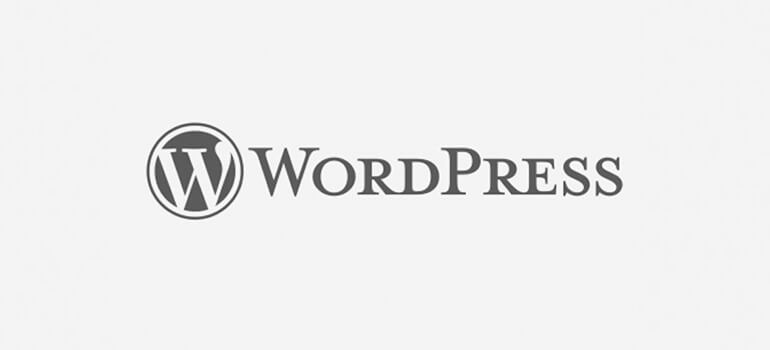
Due to the GNU license, there are no restrictions for downloading, installing, using, modifying WordPress, and even redistributing the modified version.
WordPress is written in PHP, a popular 4th Gen programming language. And it uses MySQL database, software for storing, managing, and retrieving data from the database.
Back in 2003, Matt Mullenberg and Mike Little launched WordPress as a simple blogging platform. But look at how it has grown to be the best website building platform. Yes, today WordPress can build any kind of website.
For those who didn’t know, WordPress has two versions: WordPress.org and WordPress.com. WordPress.com is fully hosted while WordPress.org is self-hosted. It asks you to choose the best hosting service for yourself. If you want to dig deeper into this, check out our article on WordPress.org vs WordPress.com.
In this article, we are going to talk about WordPress.org because it is a real WordPress.
What is Joomla? – Introduction
Joomla is an award-winning Content Management System that can build powerful websites and online applications. It is also a Free and Open-source Software (FOSS) and a Content Management System. It also uses the GNU General Public License. This makes Joomla free to install, use, modify, and redistribute.
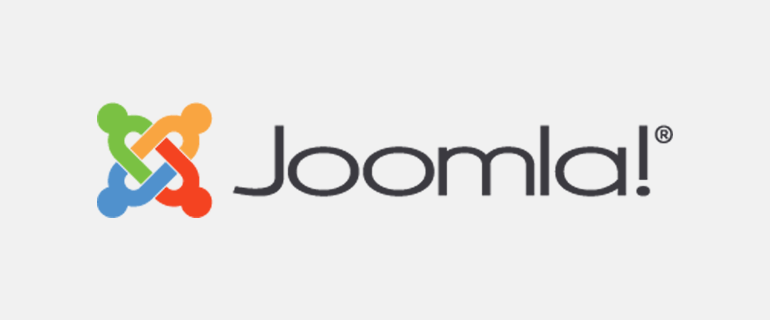
In 2005, Joomla entered the market as a rebranding of Mambo CMS by an Australian company. Joomla is relatively younger than WordPress but has grown to be an equally powerful website builder.
Just like in WordPress, Joomla also has two versions. One is ‘Joomla.org‘. Another is ‘launch.joomla.org‘. Actually, ‘Joomla.com’ and ‘launch.joomla.org’ are the same things. It is a hosted version of the Joomla platform.
Point is, you can either choose your hosting service with other platforms, or choose a domain with Joomla.
In this article, we are going to talk about the self hosted version Joomla.org, the WordPress.org equivalent of Joomla.
2. WordPress vs Joomla: CMS Market Share
WordPress: Place in the Market
Standing atop above everything else is WordPress when it comes to market share. WordPress covers over 63% of the CMS market. WordPress has gained 2% more market share than last year when it had 61.8% of the market share, as per the reports of W3techs.

As for usage, WordPress covers 39% of the websites on the internet. Compared to last year with 35.1%, WordPress powers 4% more websites.
Joomla: Market Share
There is a difference bigger than anyone would expect, regarding the market share of WordPress and Joomla. Joomla shares 3.6% of the CMS market. And the market share has decreased from last year when Joomla had 4.7% of the share.

Looking at the usage statistics, W3techs reports that Joomla powers 2.2% of all the websites on the internet. This number has also decreased from last year when Joomla powered 2.7% of all the websites.
Joomla vs WordPress: Difference in the Market
As we see, Joomla and WordPress have a huge difference in market share. A major reason is the beginner friendliness of the platform. WordPress focuses on ease of use and the community is geared towards this. While Joomla seems to focus on the potential of the software and a more developer-friendly environment.
We shall uncover other reasons for this difference later in different sections of the article.
3. WordPress vs Joomla: Getting Started
WordPress and Joomla, both may have the same job of publishing digital content, but they do it differently. Or they provide a different interface for you to do it. Let’s look at why one is for beginners and the other is more developer-tuned.
Getting Started with WordPress – Learning Curve
Starting a website in WordPress takes a few steps. First of all, you need a domain name and hosting service. A domain name is the name of your website like, ‘google.com’ or ‘themegrill.com’. Web hosting is the technology that makes your content available on the web. It’s your site’s storage location on the internet.
You can get both the domain and hosting from WordPress hosting companies like Fastdot or SiteGround.
And, you’ll get WordPress pre-installed or an option to install it with one-click. So, it’s really easy to install WordPress and get started. But make sure to choose the best WordPress hosting company.
WordPress offers a perfectly simple interface for beginners and non-developers to work in. It makes website building easy, fast, and efficient. As you can see in the screenshot below, your WordPress site’s backend is a simple workspace. It’s called dashboard or the ‘WordPress dashboard’.
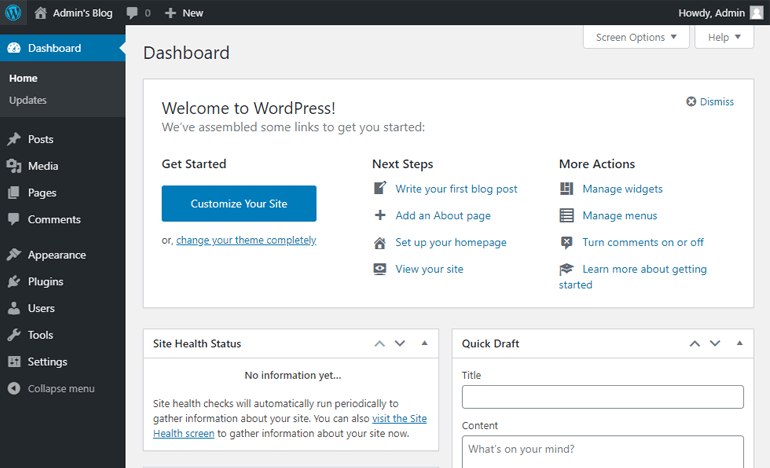
From your WordPress dashboard, you can manage all your website settings, create and publish articles, manage users and subscribers, and everything. You can use the live WordPress Customizer to design the overall appearance of your site. And edit your content using the new block-based Gutenberg Editor.
Plus, there are tons of amazing plugins in WordPress dedicated to making things simpler and easier regarding website making. Page builders like Elementor, Beaver Builder, Brizy, can create a webpage within minutes.
And, installing a theme or installing a plugin is also super easy in WordPress. WordPress maintains a repository of themes and plugins which can be accessed right from the dashboard. And you’ll find thousands of them in there.
If you need a detailed guide, then you can check out our step-by-step guide to creating a WordPress website.
Getting Started with Joomla – Learning Curve
Getting Up with Joomla is as similar as in WordPress. You can easily find a web hosting service and many will offer a one-click installation of Joomla.
But running with Joomla is relatively more complex than WordPress. The Joomla interface has a harder learning curve compared to WordPress.
Just comparing the dashboard, WordPress keeps it simple with options that you will need right away. While Joomla makes it a little overwhelming for beginners with the number of options available.
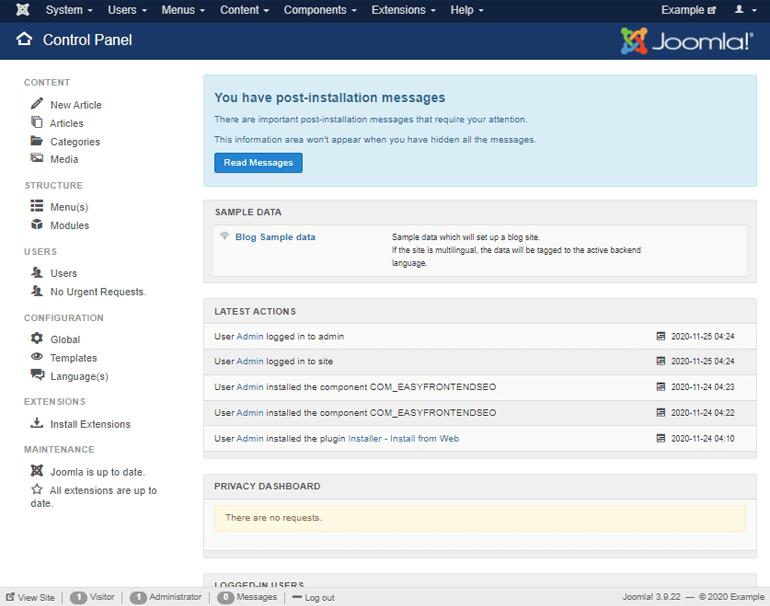
Joomla maintains a repository of extensions. So, you won’t have to scratch your head for that. But once you want to install templates and change the style of your website, that’s a pain in the head for beginners.
WordPress vs Joomla: Which is Easier?
The answer to this one is WordPress. The WordPress community has spent decades focusing on the beginner friendliness of the platform. Developers have created plugins and themes just to support beginners. Finding the best themes and templates for your site is also a piece of cake.
Joomla does have a fair amount of beginner friendliness. But the interface expects you to have enough knowledge of the web-publishing system, to begin with. This doesn’t favor people who are just starting out and are just starting to learn.
4. Joomla Compared to WordPress: Search Engine Optimization
Joomla and WordPress have done great work to make their platform best optimized for Search Engines. Let’s look at the similarities and differences in their approach.
WordPress for SEO
Right out of the box, WordPress doesn’t let you set metadata and focus keywords for your content. But WordPress is still one of the best Content Management Platforms for Search Engine Optimization.
Why? You ask. Well, that’s because WordPress core by default has tons of amazing SEO features. For example, you can create SEO friendly URLs, add title and meta description of images, etc.
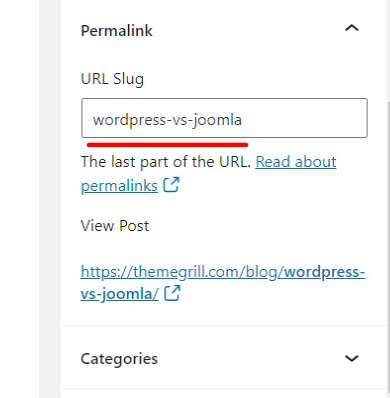
And, WordPress posts and pages have an optimized structure which is great for better search engine rankings.
In addition, it has a huge collection of plugins dedicated to SEO functionalities. For example, plugins like Yoast SEO help you set metadata, keywords, and optimize your content for better SEO.

Plugins like Google Analytics help you know how good you are with SEO writing. All this makes WordPress the best platform for writing SEO optimized content.
Even themes are made lightweight and attractive so that they can be SEO optimized. Check our handpicked list of best SEO friendly WordPress themes.
With WordPress, you can easily shape your website to be fast, professional, and attractive. This will decrease your website’s bounce rate, meaning visitors will stay longer. Web crawlers of Search Engines start favoring your site more.
SEO in Joomla
Out of the box, Joomla’s core will give you an option to set keywords and meta-description for your article. Plus, it also has SEO extensions like in WordPress.
Easy Frontend SEO is a popular Joomla extension for Search Engine Optimization in Joomla. The extension allows you to edit your meta description, keywords, slugs of your article. There is also a feature to automatically generate these without needing to input data from your side.
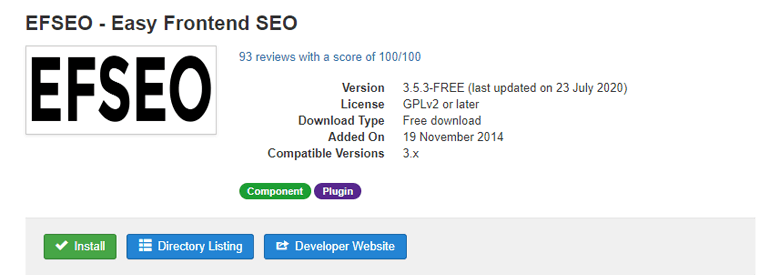
Other extensions also exist in Joomla, that help you write SEO friendly copy. Besides this, Joomla sites can also be made attractive, fast, and lightweight. But it’s also true that a stunning, fast, and SEO friendly page is a hard combo to achieve for beginners in Joomla.
Templates and website styling has a difficult learning curve in Joomla. And, it is also not easy to get around with installing and using extensions in Joomla with a very little knowledge on website building.
WordPress vs Joomla: Which is Better Optimized for SEO?
The answer should be clear at this point. WordPress is very much ahead when it comes to Search Engine Optimization. Because WordPress offers a beginner friendly environment for writing SEO friendly content.
Joomla websites are not easy to configure for beginners. This will affect the site’s beauty, loading speed and other things. Which ultimately is a bad SEO call.
5. Joomla vs WordPress: Customization and Flexibility
Time to look at the extent to which these two platforms can be customized and the flexibility they offer.
WordPress: Customization and Flexibility
WordPress is the most flexible and customizable platform on the planet. There are not one but thousands of reasons to believe that.
The first being the live WordPress Customizer. This is probably the easiest website editing tools integrated into WordPress. It lets you edit your whole WordPress site design with live previews.
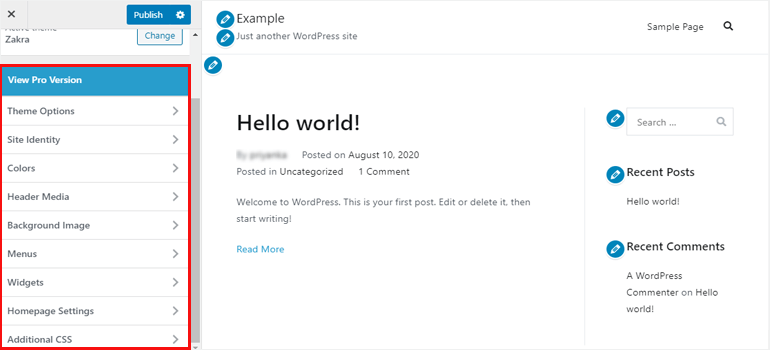
For your site’s design, there are over 7500 free themes to discover in the WordPress repository. Among them, some are really powerful and provide stunning design. Check out our list of the best free WordPress themes.
WordPress has a jaw-dropping number of free plugins, over 57,000, in its repository. That’s a really huge collection, right? You can check out our selected list of essential and best WordPress plugins.
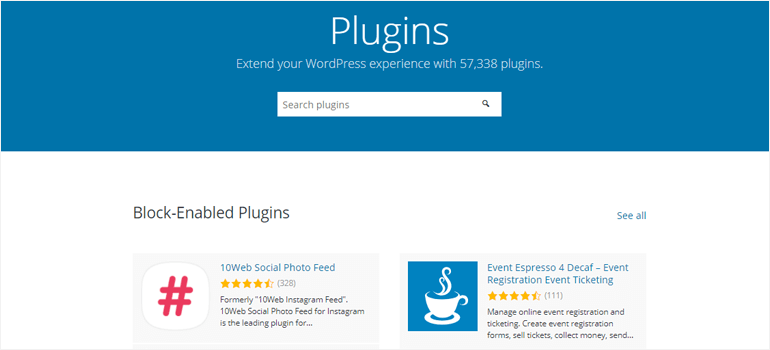
They turn your website into a powerful online presence by integrating numerous functionalities into your website.
For example, want to add a contact form on your site? No problem. Just get Everest Forms. Want to make social sharing easy on your site? Just get the Easy Social Sharing Plugin.
Customization and Flexibility of Joomla
Joomla is an equally customizable and flexible platform as WordPress. Joomla also features an editor simple enough for beginners. There are also page builders in Joomla that will ease website building for you, like SP page builder.
But compared to WordPress Joomla falls short when it comes to offering a highly customizable platform for non-developers. For starters, Joomla doesn’t keep a repository of templates. But you can find thousands of templates somewhere else, like the Joomla Templates of Nicepage.
Joomla features over 8000 extensions. And it has an official repository of those extensions.
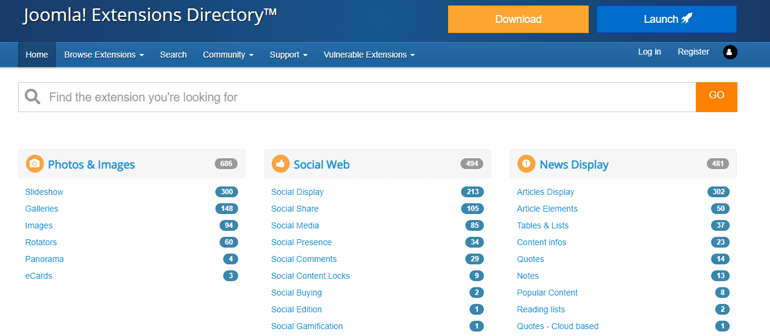
You will find different categories of extensions on that site. As in WordPress, Joomla websites can integrate multiple functionalities and make themselves powerful with these extensions.
Joomla also keeps extension for every functionality your website needs. There are extensions to make your SEO better, there are extensions for social sharing, extensions for security, and more.
WordPress vs Joomla: Which is More Customizable and Flexible?
WordPress takes a major advantage here. It has a properly built website with readily and easily available themes and plugins. While Joomla’s website seems harder to navigate while finding templates and extensions. And for beginners, that matters.
As for the flexibility of the platform, both are very flexible. If you are a developer you should have no problem tweaking the backend. But for the front part, customization is harder in Joomla.
6. WordPress vs Joomla: Security
In a perfect world with no hackers. Joomla and WordPress are the safest platforms. But that’s not the world we live in. So let’s look at how secure these platforms are.
WordPress Security
WordPress’s core is one of the safest ones out there. But WordPress is not just about the core. WordPress has gained fame and maintained it thanks to the large collection of plugins and themes. But not every plugin and theme are secure.
Plugins like Everest forms, Yoast SEO, and themes like Zakra, Spacious are regularly updated. They have a great support team as well.
But there are some plugins and themes which are abandoned. And that’s where hackers strike. According to the report by Sucuri, WordPress accounted for 74% of the hacked websites when it only had a 58.9% market share.
But it’s not like hackers can get into any WordPress websites, only the ones with outdated software. So you can indeed make your website very secure with WordPress. All you need to do is follow certain tips on making your WordPress website secure. And, if you want, you can install some of the best security plugins in WordPress like WordFence security, Sucuri security, etc.
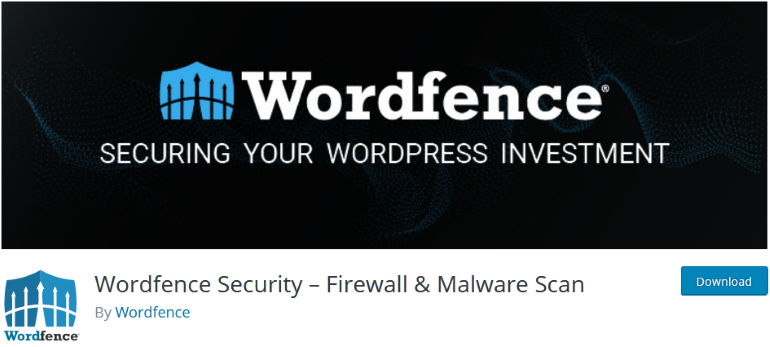
And so, It’s not WordPress that gets hacked, it’s the outdated plugins and software that people use.
Security in Joomla
Joomla is equally secure when it comes to the core. But Joomla also features extensions and templates. Some aren’t regularly maintained. And hackers find a way to get in.
Joomla had a market share of 7.3% in 2016 and Sucuri’s report shows that Joomla accounted for 17% of the hacked websites. And believe us, that is worse than what happened with WordPress. It turns out, 84% of Joomla websites were running out of date software when this happened. If you compare this to WordPress, 64% of WordPress sites were running out of date software.
As in WordPress, Joomla websites can also be made very secure following certain rules. And, you can also choose to install some extensions like jHackGuard, JomDefender, etc.
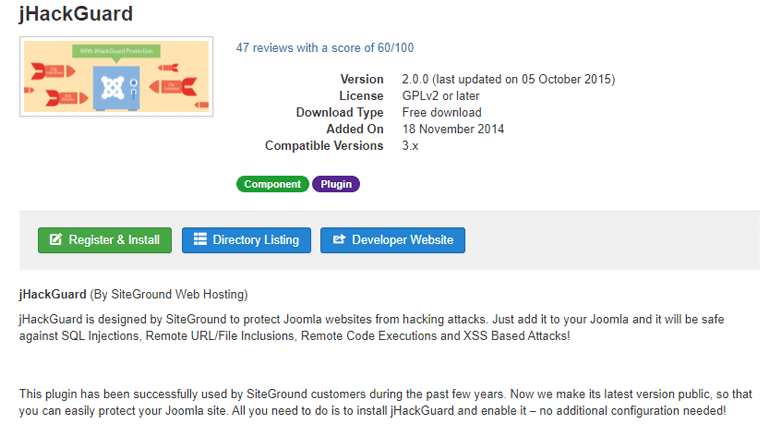
And just like in WordPress, Joomla’s core is not what gets hacked, it’s the extensions that have already expired.
Joomla vs WordPress: Which is More Secure?
The answer to this one is also WordPress. The statistics of hacked websites of WordPress is bad. But compared to Joomla, it is a little better.
This doesn’t mean you shouldn’t choose a platform. This just shows you have to be careful when it comes to the security of your site. You must review a plugin before installing it and regularly update the existing ones.
7. WordPress vs Joomla: Price
WordPress and Joomla both are free. But you do have to pay for hosting and premium themes, plugins, templates, extensions. Let’s have a look at how costly these platforms can get.
WordPress: Price
WordPress is free and open-source software. You don’t have to pay for it. But it is self-hosted and you have to find a hosting service and a domain name, which costs.
For your site’s design, you need a WordPress theme and luckily there are thousands of amazing free themes in WordPress. But your eye may sometimes catch a premium theme. Premium themes come at an average price of around $60.
Similarly, there are tons of free WordPress plugins. If you want to buy a premium plugin, then it can cost an average price of around $100-$200.
Joomla: Price
Joomla is also free and open-source software. No need to pay for the software. But since it’s self-hosted, finding a hosting service is on you.

As for templates and extensions in Joomla, there are many free templates and extensions in Joomla. But the number isn’t as big as WordPress. If you want a premium template in Joomla, the average price is around $60. The average price range of premium extensions in Joomla is also around $100-200.
Joomla vs WordPress: Which is Cost-Effective?
This one would probably be a tie if we were purely talking about the money. The cost for one theme or template, plugin or extension may seem similar. But WordPress is a monster when it comes to collection of free themes and plugins.
Most premium themes and plugins will give you a free version for fundamental functions as well. With this, WordPress is the ultimate boss in cost-effectiveness.
8. WordPress vs Joomla: Which one is for you?
If you are still wondering which software you should choose, let us make it easier. We recommend WordPress because of the beginner friendliness, large community, customizability, flexibility, and potential. You can get started following our step-by-step guide to creating a WordPress site now!
Joomla does have a reputation for being one of the best website builders. And popular websites like linux.com are made with Joomla. Developers can unlock Joomla’s potential and create stunning websites as well.
But for those who are just stepping into the world of Content Management, WordPress is your guiding angel disguised as a software.
Conclusion
WordPress and Joomla are Content Management Systems. You can create, edit, manage and present your content to the online world with them. They are two of the most popular and free website builders in the market.
But apart from this fact, there is a huge difference in market share and usage statistics of WordPress and Joomla. This resulted from the various fundamental factors like ease of use, the security of websites, customization potential, and more.
WordPress is an ideal choice for those who want to start exploring the world of Content Management and stick to it. Joomla is a developer-friendly tool that is just as flexible. But lacks the beginner-friendly environment and customization potential.
It was two of the CMSs compared. If you want to compare more CMS side by side, you should check out WordPress vs Drupal and Ghost vs WordPress.
If you think this article was helpful, please share it. Help us to share this knowledge. Also, we welcome any suggestions and feedback.
The post WordPress vs Joomla – Which is Better CMS for Your Website? appeared first on ThemeGrill Blog.


